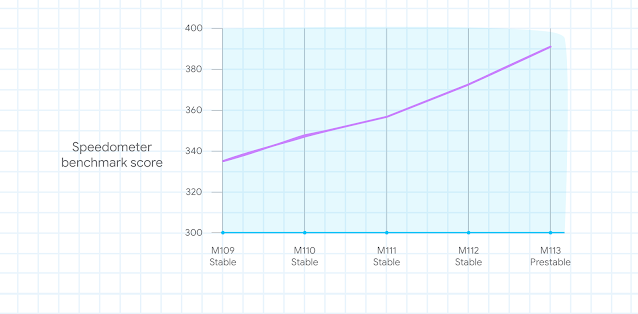Chrome is 10% faster now, but you probably won't notice it

When Google launched Chrome, it made sure that the web browser was faster than the competition browsers at the time. The company used benchmarks, mostly JavaScript, to demonstrate the superiority of its product.
A new blog post on the Chromium blog claims that Google has made Chrome 10% faster in a matter of months. The 10% figure comes from benchmarks that Google ran on Apple's Speedometer 2.1 browser benchmark. Speedometer runs a series of tests, which simulate user interactions, in the browser to determine its performance.
Google explains that it implemented "some targeted optimizations" in Chromium, the core of the Chrome web browser and also dozens of other browsers, including Microsoft Edge, Brave, Vivaldi and Opera. Apple plans to implement these changes in WebKit, the core of its Safari web browser, in the future as well.

The technical article provides a few details on the implementation. It shows a performance graph, highlighting the benchmark scores of Google Chrome 109 to 112 Stable, and Chrome 113 Beta.
Chrome 109 Stable is shown with a Speedometer benchmark score of less than 340. The score rises to 390 in Chrome 113 Beta, and all stable releases after Chrome 109 benefitted from these improvements as well. Scores depend largely on the device the browser is run on.
Google has implemented a change on Android as well, which it claims may improve performance for Chrome on some devices by up to 30%. The improvement is achieved by targeting them "with a version of Chrome that uses compiler flags tuned for speed rather than binary size". Google does not list criteria nor devices that get the speed compiler flag, nor how users can find out if their devices have the speed optimized version.
Closing Words
A 10% JavaScript performance increase in a matter of months is certainly an impressive engineering feat. While that is the case, it is likely that most Chrome users won't notice the performance gain in day to day activities. Chrome users who run expensive JavaScript applications and games in the browser may notice an improvement, however.
Good news is that all Chromium-based browsers benefit from the improvement.
Now You: do you run browser benchmarks?




















I noticed everything is 90% slower on Windows 11 than on Windows 7.
+1, I don’t know if you said that joking, but it’s mainly true. More or less.
As a dev I’m looking forward to the potential improvements after they remove Blink’s legacy layout.
Personally I will continue using Firefox, though.
I doubt that, besides 10% is nothing. There was a time around 2017 I think when Google cleaned Chrome’s old source code and allegedly made it 30% faster or something, but I didn’t really feel it, the browser just became slightly less bloated. Chrome feels kind of bloated, so does Firefox and all the Chromium forks with all their built-in feature crap they keep putting.
I’m a vehement supporter of the “ship a bare-bones browser and move all the bloatware into optional extensions that are presented to the user upon first launch so they get to choose what crap they want to bundle their browser with”.
Because if browsers are trying to incorporate everything possible into themselves, then extensions lose their relevancy.
@Allwynd > “I doubt that, besides 10% is nothing.”
10% faster is 10% faster. Nothing means 0% faster.
@upp > “NOT every fucking one has 32GB RAM and i9 and A100 like Chrome/Firefox developers.”
I agree. Every new version of every program that I have installed needs more and more resources. However the real problem is not in thoso programs but in the OS itself: with W10 all my programs run faster than now using W10. Indeed my sister’s computer works better with W10 than mine with W11 running more likely the same programs (e.g. Libreoffice, Chrome).
Finally found someone with the same opinion, yes browsers nowadays trying to do many things, watching videos, running remote desktop, video editing, image editing, code editing… Literally everything!
But that isn’t good because the cost is memory increased, NOT every fucking one has 32GB RAM and i9 and A100 like Chrome/Firefox developers. every fucking one is still using Intel Celeron, i3, i5…
So bundling web browsers that way hurt the majority of users, bad idea.